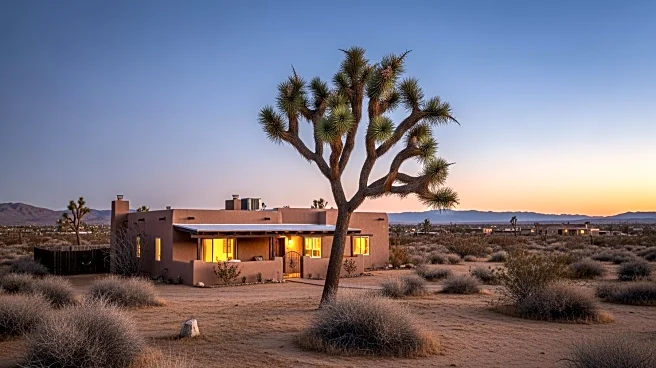What's Happening?
The short-term rental market in Joshua Tree, California, is experiencing a downturn after a pandemic-driven boom. Investors who previously capitalized on the demand for remote vacation spots are now exiting
the market, with many converting properties to long-term rentals or selling at a loss. The area saw a decrease in average available listings, dropping from 3,606 last year to 3,449 this year. The shift is attributed to a post-pandemic drop in tourism, economic uncertainty, and a volatile political climate. Local residents are grappling with the changes brought by the rental frenzy, including increased property values and altered community dynamics.
Why It's Important?
The cooling of the short-term rental market in Joshua Tree highlights broader economic and social shifts. The initial boom led to significant changes in the local real estate landscape, with property values skyrocketing and traditional communities disrupted by the influx of vacation rentals. As investors pull back, there is potential for more affordable housing to return to the market, although prices remain high. The situation underscores the challenges faced by communities in balancing tourism-driven economic growth with maintaining local character and affordability. The shift may also influence policy discussions on regulating short-term rentals and supporting sustainable community development.
What's Next?
As the market adjusts, property owners are likely to continue converting homes to long-term rentals to cover mortgage costs. Local officials and community leaders may explore strategies to stabilize housing prices and support affordable housing initiatives. The decline in short-term rentals could lead to increased availability of homes for local residents, although significant price reductions are uncertain. The community may also engage in discussions on zoning and development regulations to prevent future disruptions and ensure sustainable growth.
Beyond the Headlines
The transformation of Joshua Tree due to the short-term rental boom raises ethical and cultural questions about the impact of tourism on local communities. The influx of investors and vacationers has altered the area's identity, with traditional homes replaced by luxury rentals. The situation highlights the need for balanced development that respects local culture and supports long-term residents. It also prompts reflection on the role of social media and digital platforms in driving real estate trends and shaping community dynamics.









